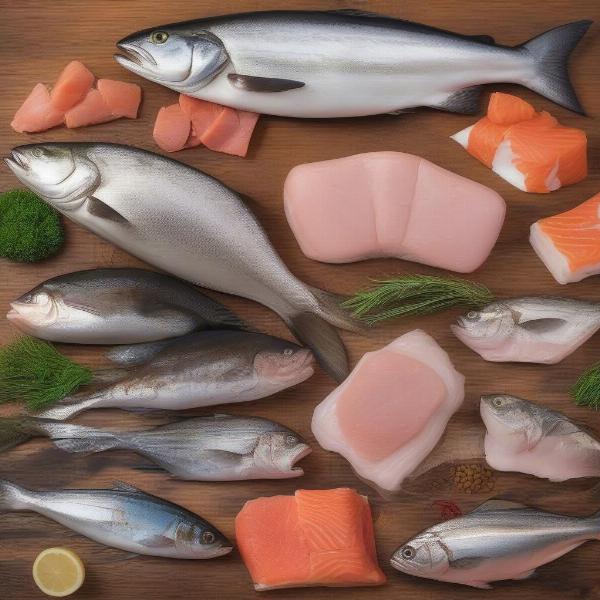Dog food with fish offers a wealth of nutritional benefits for dogs of all ages and breeds. From boosting coat health to supporting joint function, fish-based diets are becoming increasingly popular among pet owners seeking a healthy and palatable alternative to traditional protein sources. This article will delve into the advantages of dog food with fish, discuss different types of fish used, and guide you in choosing the best fish-based diet for your furry friend.
The Benefits of Fish in Dog Food
Fish is a highly digestible protein source packed with essential amino acids crucial for muscle development and overall health. The omega-3 fatty acids found in fish, particularly EPA and DHA, offer numerous benefits, including reducing inflammation, promoting healthy skin and a shiny coat, supporting cognitive function, and aiding in joint health. These fatty acids are especially beneficial for dogs with allergies, arthritis, or other inflammatory conditions. Furthermore, fish is a good source of vitamins and minerals like vitamin D, vitamin B12, iodine, and selenium, contributing to a balanced and complete diet.
Choosing the Right Fish for Your Dog
Not all fish are created equal when it comes to dog food.  Various types of fish commonly used in dog food While salmon, tuna, whitefish, herring, and cod are popular and nutritious choices, it’s essential to ensure the fish is sourced sustainably and processed safely. Avoid fish high in mercury, like swordfish and king mackerel. Look for dog food that specifies the type of fish used, as “ocean fish” can be a vague term and may indicate lower-quality ingredients. fish based dog food is a great option for dogs who may be allergic to other protein sources.
Various types of fish commonly used in dog food While salmon, tuna, whitefish, herring, and cod are popular and nutritious choices, it’s essential to ensure the fish is sourced sustainably and processed safely. Avoid fish high in mercury, like swordfish and king mackerel. Look for dog food that specifies the type of fish used, as “ocean fish” can be a vague term and may indicate lower-quality ingredients. fish based dog food is a great option for dogs who may be allergic to other protein sources.
Is Fish-Based Dog Food Right for My Dog?
Fish-based dog food can be an excellent choice for many dogs. dog food with fish oil can supplement diets that aren’t fish-based but still require the benefits of omega-3s. However, it’s essential to consider your dog’s individual needs and preferences. Some dogs may have allergies or sensitivities to certain types of fish. If you’re unsure whether a fish-based diet is right for your dog, consult with your veterinarian. They can assess your dog’s overall health and help you determine the best dietary approach.
What are the signs of a fish allergy in dogs?
Common signs of a fish allergy in dogs include itchy skin, gastrointestinal upset, ear infections, and hair loss. If you notice any of these symptoms after switching to a fish-based diet, discontinue feeding it and contact your vet.
Types of Fish-Based Dog Food
You can find fish in various forms in dog food, including whole fish, fish meal, and fish oil. Whole fish is generally considered the most nutritious option, followed by fish meal. Fish oil is often added to dog food as a supplement to boost omega-3 fatty acid content. sardine dog food provides a balanced source of omega-3s. You can choose from dry kibble, wet food, or a combination of both, depending on your dog’s preferences and dietary needs. best fish dog food articles can help narrow down your choices.
Conclusion
Dog food with fish can be a highly beneficial addition to your dog’s diet, providing essential nutrients, supporting overall health, and contributing to a shiny coat and healthy skin. By understanding the different types of fish used in dog food and considering your dog’s individual needs, you can make an informed decision and choose the best fish-based diet to keep your furry companion happy and healthy. dog food with white fish is a particularly palatable option for many dogs.
FAQ
- Is fish-based dog food good for puppies? Yes, fish-based dog food can be a good option for puppies, providing them with the essential nutrients they need for growth and development.
- Can I feed my dog fish every day? Yes, you can feed your dog a complete and balanced fish-based dog food every day.
- How much fish-based dog food should I feed my dog? Follow the feeding guidelines on the dog food packaging and adjust the portion size based on your dog’s age, weight, activity level, and individual needs.
- What are the best types of fish for dog food? Salmon, tuna, whitefish, herring, and cod are all excellent sources of protein and omega-3 fatty acids for dogs.
- Are there any risks associated with feeding my dog fish? Some dogs may have allergies or sensitivities to certain types of fish. It’s important to introduce fish-based food gradually and monitor your dog for any adverse reactions.
About ILM Dog
ILM Dog is your trusted resource for expert advice on all aspects of dog care and well-being, from breed selection and nutrition to training, health, grooming, and product recommendations. We provide practical, up-to-date information for dog owners worldwide, catering to all experience levels. Whether you’re a first-time puppy parent or a seasoned dog owner, ILM Dog is here to help you navigate the wonderful world of dog ownership. Contact us for personalized advice: Email: [email protected], Phone: +44 20-3965-8624.